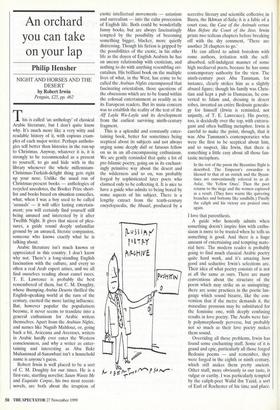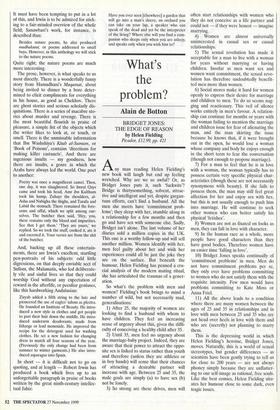An orchard you can take on your lap
Philip Hensher NIGHT AND HORSES AND THE DESERT by Robert Irwin Penguin, £25, pp. 462 This is called 'an anthology' of classical Arabic literature, but I don't quite know why. It's much more like a very witty and readable history of it, with copious exam- ples of each major writer. Perhaps antholo- gies sell better than histories in the run-up to Christmas. Anyway, whatever it is, it is strongly to be recommended as a present to yourself, to go and hide with in the library whenever the whole millennium- Christmas-Turkish-delight thing gets right up your nose. Unlike the usual run of Christmas-present books — anthologies of recycled anecdotes, the Booker Prize short- list and books based on situation comedies, what, when I was a boy used to be called 'annuals' — it will offer lasting entertain- ment; you will certainly find yourself still being amused and interested by it after Twelfth Night. It gives that nicest of plea- sures, a guide round deeply unfamiliar ground by an amused, literate companion, someone who knows exactly what he is talking about.
Arabic literature isn't much known or appreciated in this country. I don't know why not. There's a long-standing English fascination with the culture, and every so often a real Arab expert arises, and we all find ourselves reading about camel races. T. E. Lawrence is probably the best remembered of them, but C. M. Doughty, whose thumping Arabia Deserta thrilled the English-speaking world at the turn of the century, exerted the more lasting influence. But, however popular the popularisers become, it never seems to translate into a general enthusiasm for Arabic writers themselves. Apart from the Arabian Nights, and names like Naguib Mahfouz, or, going back a bit, Avicenna and Averroes, writers in Arabic hardly ever enter the Western consciousness, and why a writer as enter- taining and interesting as Abu Bakr Muhammad al-Sanawbari isn't a household name is anyone's guess.
Robert Irwin is well placed to be a sort of C. M. Doughty for our times. He is a first-rate, startling novelist; Satan Wants Me and Exquisite Corpse, his two most recent- novels, are both about the irruption of exotic intellectual movements — satanism and surrealism — into the calm procession of English life. Both could be wonderfully funny books, but are always fascinatingly tempted by the possibility of becoming something bigger, blacker, more quietly distressing. Though his fiction is gripped by the possibilities of the exotic, in his other life as the doyen of English Arabists he has an uneasy relationship with exoticism, and nothing to do with anything resembling ori- entalism. His brilliant book on the multiple lives of what, in the West, has come to be called the Arabian Nights encompassed that fascinating orientalism, those questions of the obsessions which are to be found within the colossal entertainment as readily as in its European readers. But its main concern was to establish the reality of the text of the Alf Layla Wa-Layla and its development from the earliest surviving ninth-century fragment.
This is a splendid and constantly enter- taining book, better for sometimes being sceptical about its subjects and not always urging some deeply dull or fatuous fellow on us in an all-encompassing enthusiasm. We are gently reminded that quite a lot of pre-Islamic poetry, going on in its enchant- ingly primitive way about the desert and the wilderness and so on, was probably forged by sophisticated later poets who claimed only to be collecting it. It is nice to have a guide who admits to being bored by some aspects of his subject. There is a lengthy extract from the tenth-century encyclopaedia, the Musail, produced by a secretive literary and scientific collective, in Basra, the Ikhwan al-Safa; it is a fable of a court case, the Case of the Animals versus Man Before the Court of the Jinn. Irwin prints two tedious chapters before breaking off with the dry comment, 'There are another 28 chapters to go.'
He can afford to admit boredom with some authors, irritation with the self- absorbed, self-indulgent manner of some high mediaeval poets, because he has some contemporary authority for the view. The ninth-century poet Abu Tammam, for instance, clearly strikes him as a slightly absurd figure; though his family was Chris- tian and kept a pub in Damascus, he con- verted to Islam and, dressing in desert robes, invented an entire Bedouin genealo- gy for himself (Irwin is reminded, not unjustly, of T. E. Lawrence). His poetry, too, is decidedly over the top, with extrava- gant and often baffling metaphor. Irwin is careful to make the point, though, that it was Abu Tammam's contemporaries who were the first to be sceptical about him, and to suspect, like Irwin, that there is something a little easy about all those fan- tastic metaphors.
In the rest of the poem the Byzantine flight is described. The Emperor's cowardice is likened to that of an ostrich and the Byzan- tines are conventionally referred to as al- Asfar, 'the Yellow Ones'. Then the poet returns to the 'siege and the women captured as a result. (They have waists like quivering branches and bottoms like sandhills.) Finally the caliph and his victory are praised once again.
I love that parenthesis.
A guide who honestly admits when something doesn't inspire him with enthu- siasm is more to be trusted when he tells us something is good. And there is a huge amount of entertaining and tempting mate- rial here. The modern reader is probably going to find much classical Arabic poetry quite hard work, and it's amazing how good and seductive Irwin's selections are. Their idea of what poetry consists of is not at all the same as ours. There are many conventions about the structure of the poem which may strike us as uninspiring; there are some practices in the poetic lan- guage which sound bizarre, like the con- vention that if the metre demands it, the masculine pronoun may be substituted for the feminine one, with deeply confusing results in love poetry. The Arabs were fair- ly polymorphously perverse, but probably not so much as their love poetry makes them sound.
Overriding all these problems, Irwin has found some enchanting stuff. Some of it is grand and epic, particularly all those forged Bedouin poems — and remember, they were forged in the eighth or ninth century, which still makes them pretty ancient. Other stuff, more obviously to our taste, is vulgar or earthy. I was particularly tempted by the caliph-poet Walid ibn Yazid, a sort of Earl of Rochester of his time and place. It must have been tempting to put in a lot of this, and Irwin is to be admired for stick- ing to a fair-minded overview of the whole field; Sanawbari's work, for instance, is described thus:
Besides nature poems, he also produced mudhakarat, or poems addressed to small boys. However, in this anthology we will stick to the nature poems.
Quite right; the nature poems are much more interesting.
The prose, however, is what speaks to us most directly. There is a wonderfully funny story from Hamadhani's Maqamat, about being invited to dinner by a bore deter- mined to elicit compliments for everything in his house, as good as Chekhov. There are ghost stories and serious scholarly dis- quisitions. There is a series of macabre sto- ries about murder and revenge. There is the most beautiful flourish in praise of pleasure, a simple list of the objects which the writer likes to look at, or touch, or smell. There is the unmissable information that Ibn Washshiya's Kitab al-Sumum, or 'Book of Poisons', contains 'directions for making killer castanets'. And there are ingenious insults — my goodness, how there are insults, a genre in which the Arabs have always led the world. One poet to another: Poetry was once a magnificent camel. Then, one day, it was slaughtered. So Imrul Qays came and took his head, Amr ibn Kulthum took his hump, Zuhayr the shoulders, al- Asha and Nabigha the thighs, and Tarafa and Labid the stomach. There remained the fore- arms and offal, which we split among our- selves. The butcher then said, 'Hey, you, there remains only the blood and impurities. See that I get them.' They are yours,' we replied. So we took the stuff, cooked it, ate it and excreted it. Your verses are from the shit of the butcher.
And, backing up all these entertain- ments, there are Irwin's excellent, startling pen-portraits of his subjects: odd little digressions, on that deeply enviable sect of Sufism, the Malamatis, who led deliberate- ly vile and sinful lives so that they could worship God without any expectation of reward in the afterlife, or peculiar geniuses, like this hardworking Andalusian:
Ziryab added a fifth string to the lute and pioneered the use of eagles' talons as plectra. He founded an Institute of Beauty. He intro- duced a new style in clothes and got people to part their hair down the middle. He intro- duced underarm deodorants, made from litharge or lead monoxide. He improved the recipe for the detergent used for washing clothes. He set a new fashion for changing dress to match all four seasons of the year. (Previously the only change had been from summer to winter garments.) He also intro- duced asparagus into Spain.
In short — it is difficult not to go on quoting, and at length — Robert Irwin has produced a book which lives up to an unforgettable paragraph in praise of books written by the great ninth-century intellec- tual Jahiz:
Have you ever seen [elsewhere] a garden that will go into a man's sleeve, an orchard you can take on your lap, a speaker who can speak of the dead and yet be the interpreter of the living? Where else will you find a com- panion who sleeps only when you are asleep, and speaks only when you wish him to?



























































































 Previous page
Previous page